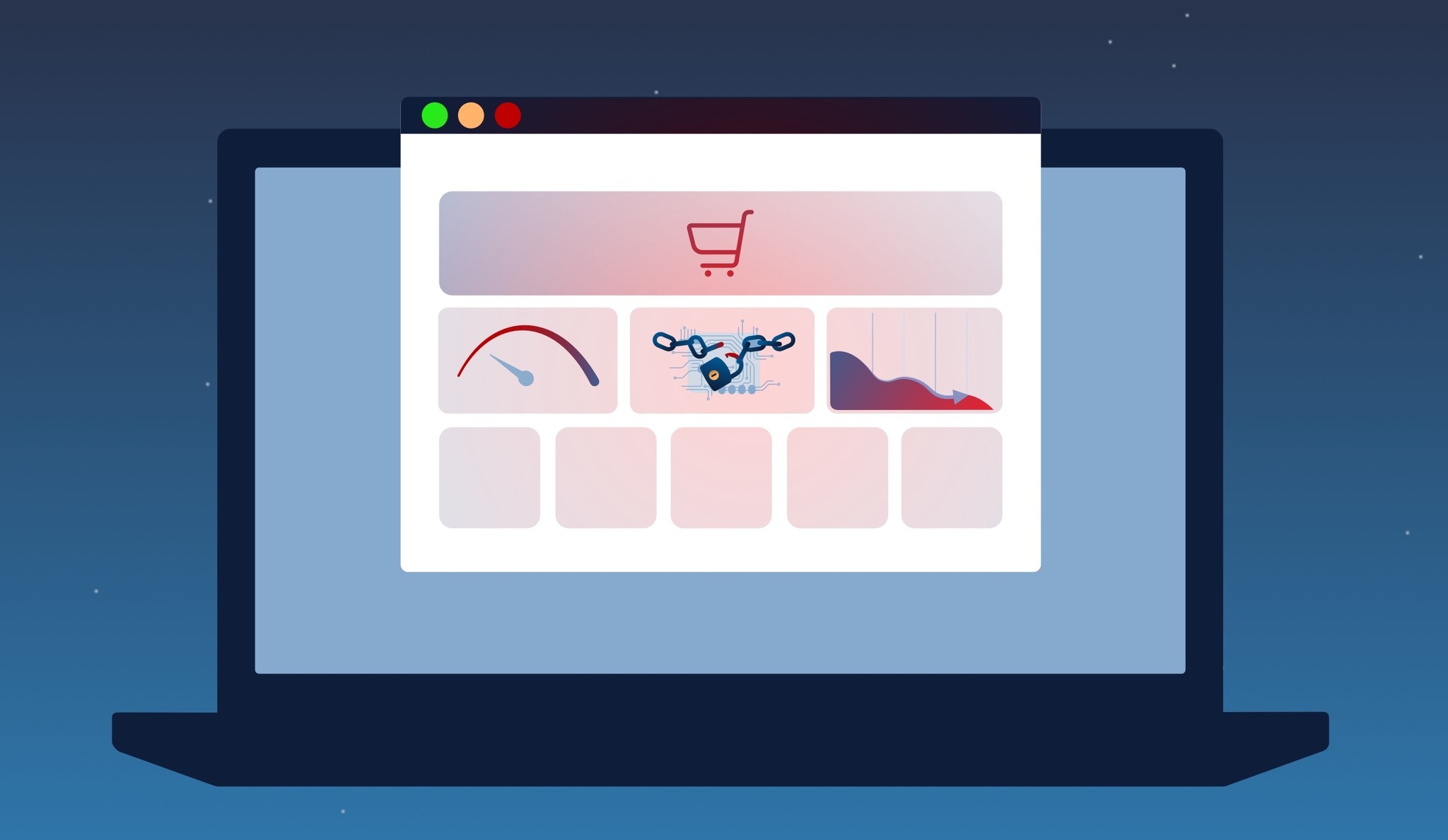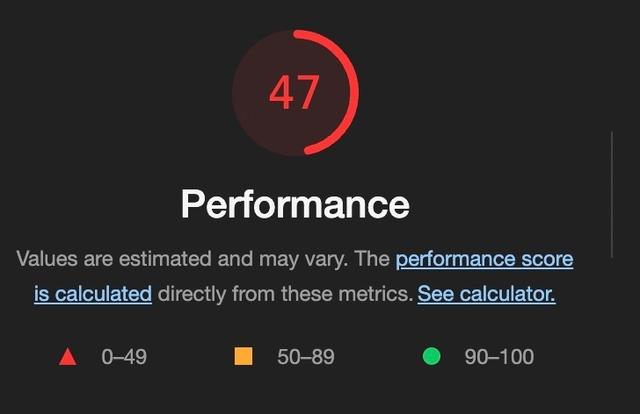
8 Cons of Template CMS Powered Website Design for Your SEO
Template CMS-powered websites are often incompatible with Google’s search engine algorithm. That's the unfortunate truth. Ranking on the search engine results page is challenging. Ranking in search is trickier with a template content management system (CMS) powered website design.
We want businesses to understand their position on the web. So, we gathered the 8 reasons why template website design can harm your SEO performance.
1. Slow Page Load Speed

47 indicates a very low page load speed
Google cares about the experience that users have on your site. So, page load speed has a massive effect on a website's ability to rank well on the search engine results page. According to Google, 53% of users leave if a website takes more than 3 seconds to load. Load speed is also one of the few metrics Google makes accessible to everyone.
In other words, Google will deprioritize any site that doesn't load in less than 3 seconds. If your site is performant, Google's algorithm will often give you a competitive edge.
So, SEO best practices for modern search algorithms mean investing in a performant website. Template CMS-powered sites often go years without a significant update to their base code and use poorly optimized plugins.
2. Non-Accessible Design
Accessible web design, like page load speed, is a primary factor in SEO. It's also illegal for businesses on the web to use a website that's not accessible. You can read more about the legal requirements in our accessibility blog post.

87 indicates an accessibility rank from Google that calls out several, prominent elements that are not considered accessible
The only solution for accessible web design on a template site is often a third-party plugin. So, accessible web design is at its best when your website is custom-built.
Unfortunately, without a web developer's intervention, all third-party accessibility solutions fail. There are so many variables that a single plugin can't fix every website's issues.
On a custom site, developers have easier access to your website's code. They will also have a better understanding of how your code works. So, your template CMS-powered website will likely need custom work to become compliant.
3. Technical SEO Execution
Technical SEO is a broad term that refers to tasks that often need a developer. Technical SEO can include:
- Fixing broken links and redirects
- Optimizing and submitting your sitemap to Google
- Improving page load speed
- Improving accessibility
- Creating mobile-optimized breakpoints
- Optimizing alt text and meta-data
- Proper website schema markup and structured data implementation
- Bug fixes
The list goes on. Using a template CMS-powered website builder often introduces unnecessary technical SEO roadblocks. Our experience has shown that effective technical SEO requires professional help or in-depth knowledge of web development.
4. Template CMS Powered Websites Often Under-Perform on Mobile
Mobile performance has been central to ranking in Google search since 2015's 'mobilegeddon.' If your site has poor mobile performance, it will struggle to rank—period.
Template CMS-powered websites often underperform on mobile. This has always been the case.
In recent years, mobile responsive layouts have become half-passable. Unfortunately, glaring flaws remain in templated mobile site designs. Template sites still suffer from:
- Slow page load speeds
- UX design that will not work on newer devices
- Optimization for too few breakpoints
- A lack of quality assurance
- Inflexible development tools
When you find a broken layout element on mobile, there's often little hope that anyone will (or can) fix it. The only option for many template CMS-powered sites is a workaround, coding knowledge, or living with a broken site.
In short, there is no way to escape a compromise in mobile performance with a template website design.
Custom website design solves these issues. Custom web design includes hand-tuned responsive layouts, fast mobile speeds, and local support.
5. SEO Features Are Often Pay-to-Play

A Business Owner Paying for Yoast Premium
Businesses that build websites using template site builders can access SEO tools. Unfortunately, most tools and plugins cost money for features past the bare essentials. This adds unexpected costs to template CMS-powered websites.
Subscribing to an SEO tool also places any work you do in a precarious position. Changing SEO tools down the road often means losing essential optimizations.
Yoast SEO is an excellent example. Yoast is one of the most popular SEO plugins for template CMS-powered websites. The basic version is free. The free version allows access to basic features, like editing page-specific metadata.
Still, necessary SEO features, including 301 redirects, are behind a paywall. 301 redirects are also precarious when you change SEO tools. Changing tools will break any redirects, meaning you must track down and fix broken links.
6. Out of Date SEO Features
Template CMS-powered websites rely on the end user (you) to maintain their SEO tools.
So, you risk bugs and glitches following updates to SEO plugins—even if you pay a premium. This leads to many websites running out-of-date plugins. Out-of-date plugins will always harm performance and pose security risks.
7. Template CMS-Powered Websites Are Worse for the Buying Journey

Customer Who Doesn't Know Where to Go
Template CMS-powered websites are generalist designs made to appeal to a large market. General designs often mean a decrease in dwell time—the time a user spends engaging with a specific page. Unfortunately, template sites use designs that convert fewer customers in a specific niche.
Template sites also have technical problems that decrease dwell time. Those factors include low page load speeds, confusing mobile layouts, and inaccessible design. Google loves high dwell times when its algorithm evaluates a website. So, any factors that decrease dwell times are bad for your SEO.
8. Google Associates Aspects of Template CMS Powered Website Design With Spam
Google launched a spam score evaluation tool called 'SpamBrain' in 2018. SpamBrain is an AI that relies on deep learning to identify spammy websites. It looks for, among many other things, websites that don't adhere to SEO best practices.
SpamBrain learns by gathering and analyzing as many spammy websites as it can. It will then attempt to tell if the effort you've put into making the best website for users is genuine. Over the last four years, that algorithm has become precise.
Many scam sites and link farms rely on templates and scraped or thin content to create websites. So, SpamBrain will find many aspects of template CMS-powered websites to be spammy.
SpamBrain's continued analysis of template CMS-powered websites further reinforces their downsides.
Template CMS Powered Vs. Custom
Most view template CMS-powered sites as an easy alternative to professional website design from a custom website design firm. So, template site companies have designed them with a quantity over quality mindset.
In our experience, website templates:
- Are costly to maintain
- Offer generalist designs
- Are difficult to edit
- Need inefficient plugins to offer most solutions
This means that website templates break fast and underperform in critical SEO metrics. Our website refresh clients often leave their template CMS-powered sites for our custom design. As a bonus, our prices are close to agencies that use website template builders for client sites.
Custom websites need less upkeep, are often cheaper, and are more reliable in the long run. We build custom websites with a philosophy of completeness. That means a modern codebase, a custom management app and portal, tuned breakpoints, and zero plugins. Custom sites from JTech also perform better when search engine optimized.
Work With JTech's Website Design Professionals to Design a Custom Website
We have partnered with businesses in Southwestern Montana for 25 years. We help our clients create the perfect, custom website tailored to their business. We have extensive experience saving customers by refreshing old WordPress, Wix, and SquareSpace template websites.
Reach out if your business has an old, broken template website and a distant support team. We would love to discuss moving your business from a template website solution to a custom one with a clutter-free management app and portal.
If you prefer your current template website, we're also happy to help. Our SEO team will optimize your website to perform in search as well as a template site can.
